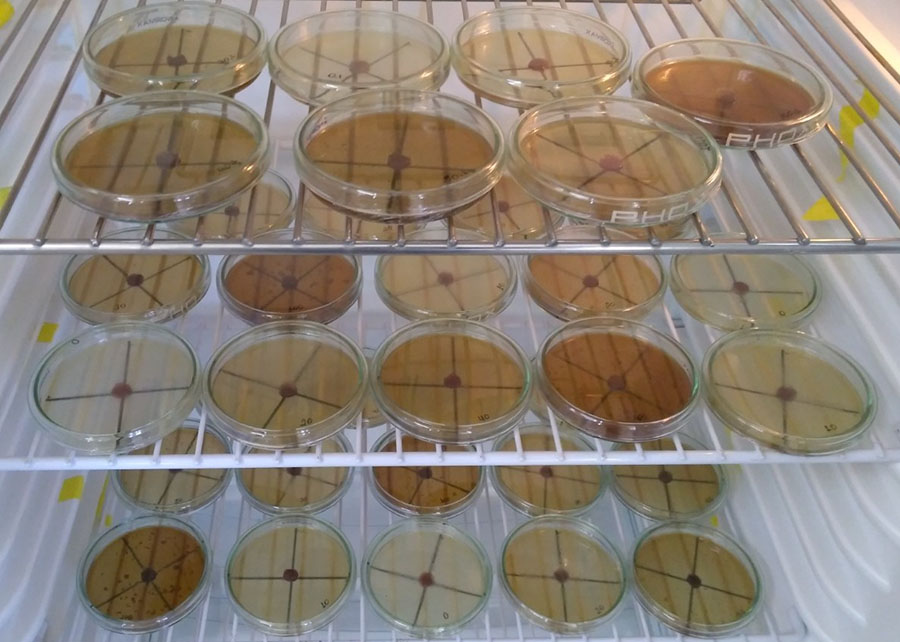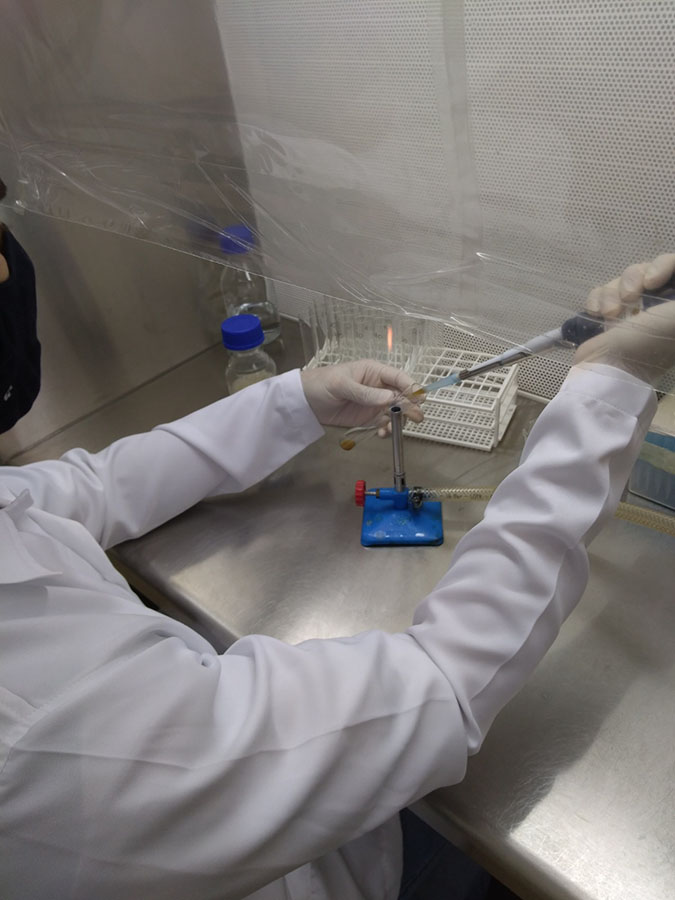Larva frass can control tomato diseases
Larva frass can control tomato diseases

Study on the effect of frass aqueous extract on the mycelial growth of Fusarium oxysporum f. sp. lycopersici race 3
|
A team of scientists at Federal University of Lavras (UFLA) and at Embrapa found that the frass of the commercial production of Tenebrio molitor, an insect commonly used as animal feed, suppresses two important pathogens in agriculture: the fungus Fusarium oxysporum and the nematode Meloidogyne incognita.
 Laboratory tests evaluated the effects of the frass on the spore germination and growth of Fusarium oxysporum race 3. The scientists also studied the effects on hatching, mobility, and mortality of juveniles of Meloidogyne incognita. The results showed a significant reduction of spores germination (up to 84%), and an impressive decrease in the nematode hatching (up to 97%).
Laboratory tests evaluated the effects of the frass on the spore germination and growth of Fusarium oxysporum race 3. The scientists also studied the effects on hatching, mobility, and mortality of juveniles of Meloidogyne incognita. The results showed a significant reduction of spores germination (up to 84%), and an impressive decrease in the nematode hatching (up to 97%).
Additionally, the pioneering study showed that the incubation and incorporation of Tenebrio molitor larva frass into the soil promotes growth and development of plants because it increases the quantity of available nutrients. The study also demonstrated that the frass is not toxic, that is, it does not cause phytotoxicity. In addition, the frass contains a beneficial microbiota, which produces essential chemicals to a healthy plant development. One of the components found in the frass is chitin, a polymer that benefits agriculture.
João Pedro Gondim, a researcher at UFLA, highlights the importance of the study. “The research demonstrated scientifically and technically the advantages of the use of Tenebrio molitor, frass, not only for insect biofactories and users, but also for farmers and agriculture professionals. We observed a significant increase in the aerial and root biomass of the plants, and we demonstrated the mechanisms that suppress the populations of those pathogens".
 Pathogens cause billions in losses for agriculture
Pathogens cause billions in losses for agriculture
Pathogens like the fungus Fusarium oxysporum and the Meloidogyne genus of nematodes represent a constant threat to farmers due to considerable economic losses and significant challenges for food security. It is estimated that these pathogens cause losses of billion dollars every year worldwide.
In Brazil, it is estimated that nematodes cause losses of around 65 billion reais a year, especially due to intense usage of the soil and the succession of crops that are susceptible to those phytopathogens. Thus, the research findings point to an efficient and sustainable potential solution to minimize the problem.
Tests under controlled conditions also demonstrated a suppressive effect of the larva frass on Fusarium wilt in tomatoes. It was observed a significant reduction of 18% in the disease severity and a surprising increase in the plant development: up to 328%.
Additionally, there were tests under field conditions to investigate the effect of larva frass application to the soil on nematode population and on tomato yield. The results of those experiments showed a great reduction in the number of nematodes (up to 88%) and a significant increase in yield, reaching 163%.
The research also carried out experiments to evaluate the contribution of the larva frass volatile compounds in antifungal and nematicidal activities and for a better understanding of the mechanisms involved in its biological action.
 “The results of these experiments provided insights on the potential of the Tenebrio molitor to control diseases affecting crops, as they are the foundation for the findings and conclusions presented by the study”,Wagner Bettiol, a researcher at Embrapa Environment,says.
“The results of these experiments provided insights on the potential of the Tenebrio molitor to control diseases affecting crops, as they are the foundation for the findings and conclusions presented by the study”,Wagner Bettiol, a researcher at Embrapa Environment,says.
Bettiol affirms that the results are promising, since the Tenebrio molitor larva frass may be an efficient tool to control tomato and other crop diseases. In addition, the approach represents a significant advance regarding sustainable agriculture and might play an important role to guarantee global food security, according to the researcher.
This study has the potential to guarantee a greater return on the commercial production of Tenebrio molitor, as it will add value to the frass generated in the production of this important animal protein, comments the scientist. Furthermore, the researcher reports that there is a prospect that products will be made available if companies in the sector see potential in the Brazilian market.
Cristina Tordin (MTb 28.499/SP)
Embrapa Environment
Marcos Vicente (MTb 19.027/MG)
Embrapa Environment
Press inquiries
meio-ambiente.imprensa@embrapa.br
Phone number: +55 19 3311 2608
Translation: Ana Maranhão
Superintendency in Communications
Further information on the topic
Citizen Attention Service (SAC)
www.embrapa.br/contact-us/sac/
